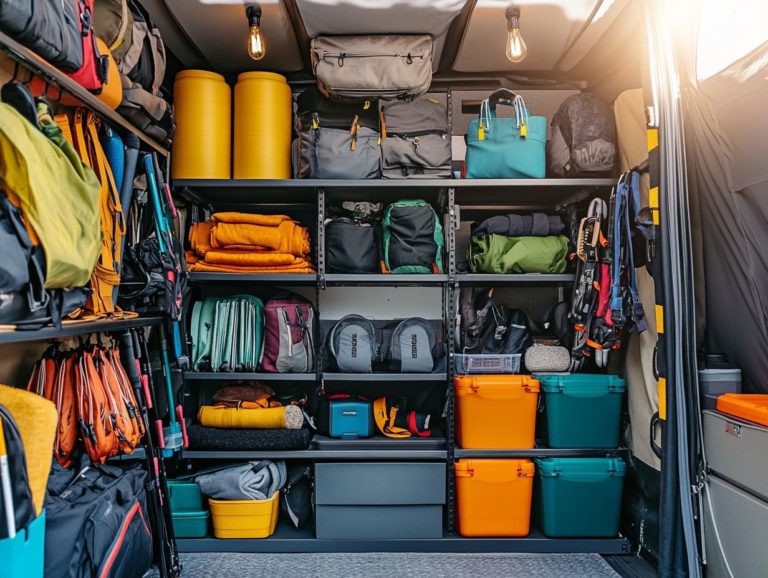What are the Pros and Cons of Renting Gear?
Renting gear can be an excellent choice for outdoor enthusiasts and hobbyists like yourself. It provides a flexible solution without the burden of ownership.
But how can you determine if it’s the right option for you?
This guide delves into the details of gear rental. It covers the various types available, the advantages such as cost savings and convenience and the potential drawbacks that might surprise you.
You’ll find key factors to consider before you make that rental decision. We also provide tips to ensure a seamless experience.
Whether you’re gearing up for a weekend adventure or exploring the concept of gear rental, we’re excited to help you navigate this journey!
Contents
Key Takeaways:

- Renting gear can be a cost-effective and convenient option for those who only need equipment for short periods.
- However, it also carries potential risks and limitations, such as not having access to the latest technology or facing additional fees for damage or late returns.
- Act now to assess your needs and budget. Follow tips such as researching rental companies and thoroughly inspecting equipment before use to make the most of your rental experience.
Understanding Gear Rental
Understanding gear rental requires grasping the details of the equipment rental market. This market includes a wide range of large machines used in construction.
This market gives contractors the flexibility to rent specialized equipment that perfectly aligns with their project needs. This eases the financial strain and upfront investment tied to purchasing machinery outright.
Rental companies serve a crucial function. They offer essential services that cater to various contractor needs while addressing concerns related to maintenance costs and equipment logistics.
Definition and Common Types
Gear rental is the process of renting machinery, particularly heavy equipment needed for construction projects, without the hassle of ownership.
This approach gives you access to a vast array of essential machinery from powerful excavators and versatile cranes to earth-moving equipment all designed to enhance efficiency on your job site.
By opting to rent, you can sidestep the substantial upfront costs that come with purchasing such specialized equipment.
Renting offers flexibility in your project budgeting. It also allows you to leverage the latest technology and models, which may be too expensive to own.
With many rental services including maintenance and support, you can focus on your projects rather than repair logistics. This maximizes productivity and minimizes downtime.
Pros of Renting Gear

Renting gear offers substantial advantages for contractors. It presents opportunities for cost savings and the flexibility to adjust to changing project schedules and equipment requirements.
This approach is especially practical in the dynamic landscape of the construction industry.
By choosing to rent, you can avoid the hefty upfront costs tied to purchasing equipment. Rental agreements often lead to reduced maintenance expenses and minimized depreciation, contributing to more effective financial planning.
Cost Savings and Convenience
The cost savings associated with renting equipment can be significant. This allows you to avoid the hefty upfront expenses of purchasing heavy machinery and the ongoing maintenance costs that accompany ownership.
By choosing rental agreements, you gain the advantage of fixed rental payments. This facilitates predictable budgeting and smooth cash flow management.
Rather than tying up capital in expensive machinery, you can redirect those funds toward growth and development.
Leasing options often grant you access to the latest models and technology. This ensures you re always well-equipped for the task at hand. This flexibility boosts operational efficiency and alleviates the pressure of long-term commitments.
Cons of Renting Gear
Renting equipment offers distinct benefits. However, it’s essential to weigh the potential risks and limitations you might encounter. Consider the ongoing rental costs that can add up over time and the problems managing equipment that may surface during a project.
Being aware of these factors will help you make informed decisions and optimize your operations.
Potential Risks and Limitations

The primary risks of renting gear include the potential for rental costs to accumulate and eventually surpass the costs of ownership over time. Uncertainties tied to rental contracts can also impact your decisions as a contractor.
These uncertainties pose significant challenges, especially when it comes to forecasting your project budgets and timelines. You may find yourself navigating restrictive terms that limit your flexibility, complicating your operational rhythm.
The ongoing rental of equipment can obscure the true cost of ownership. This complexity makes long-term financial planning more difficult.
When you factor in equipment depreciation, the situation becomes even more critical. Rental gear typically loses value without actually contributing to your asset base. It’s essential to weigh these factors carefully to ensure sustainable profitability while maintaining a competitive edge in your projects.
Factors to Consider Before Renting Gear
Before renting gear, evaluate your specific equipment needs and budget constraints. These considerations significantly impact your rental choices and overall financial strategy.
By assessing these factors, you can make informed decisions that align with your objectives.
Assessing Your Needs and Budget
Assessing your needs and budget is crucial for successful equipment rental. This evaluation dictates the types of machinery you ll require and aids in estimating overall equipment costs against your available cash flow.
This initial evaluation helps you select the right equipment and aligns your choices with the financial health of your project. Grasping the specific requirements of the job enables you to narrow down options to those that are both suitable and cost-effective.
Each piece of machinery carries its own rental rates, maintenance expenses, and potential operational costs. These factors can significantly impact your overall budget.
Consider rental duration and maintenance responsibilities, as they play a vital role in determining your total expenditure. By analyzing these elements thoroughly, you ensure that your project goals are met without straying beyond your financial limits.
Tips for Renting Gear

To elevate your rental experience, embrace key strategies that enhance both the efficiency and effectiveness of your equipment rental process. Pay attention to rental agreements and equipment management techniques, as these elements can significantly influence your overall success.
Maximizing Your Rental Experience
Maximizing your rental experience requires a deep understanding of rental services and effective management of equipment. This ensures it aligns perfectly with your project demands while avoiding unexpected delays.
To achieve this, thoroughly review rental contracts, paying meticulous attention to terms concerning usage and maintenance. Establishing a strong line of communication with rental companies can be invaluable; this enables you to address any issues promptly and fosters a collaborative relationship.
Implementing a detailed inventory system alongside regular check-ins on the equipment’s status can help avert costly problems and ensure compliance with specified guidelines. Being proactive will enhance your workflow efficiency and contribute significantly to the successful execution of your projects.
Frequently Asked Questions
Please check back soon for our Frequently Asked Questions section, which will provide valuable insights and answers to common queries regarding renting gear.
Ready to start planning your rental strategy? Take action today and ensure your next project runs smoothly!
What are the Pros of Renting Equipment?
1. Save money! Renting equipment means you avoid spending a lot on expensive purchases.
2. Enjoy variety! Renting gives you access to a wide range of options, letting you find exactly what you need.
3. Experience convenience! You won’t need to worry about storage or maintenance, making it easy for occasional use.
What are the Cons of Renting Equipment?
1. Limited availability can be a hassle. Popular items might not always be ready for you when you need them.
2. You don t own it. If you find yourself needing equipment often, buying might be the smarter choice.
3. Quality can vary. Some rented equipment might not be in great shape, which could inconvenience you during use.






